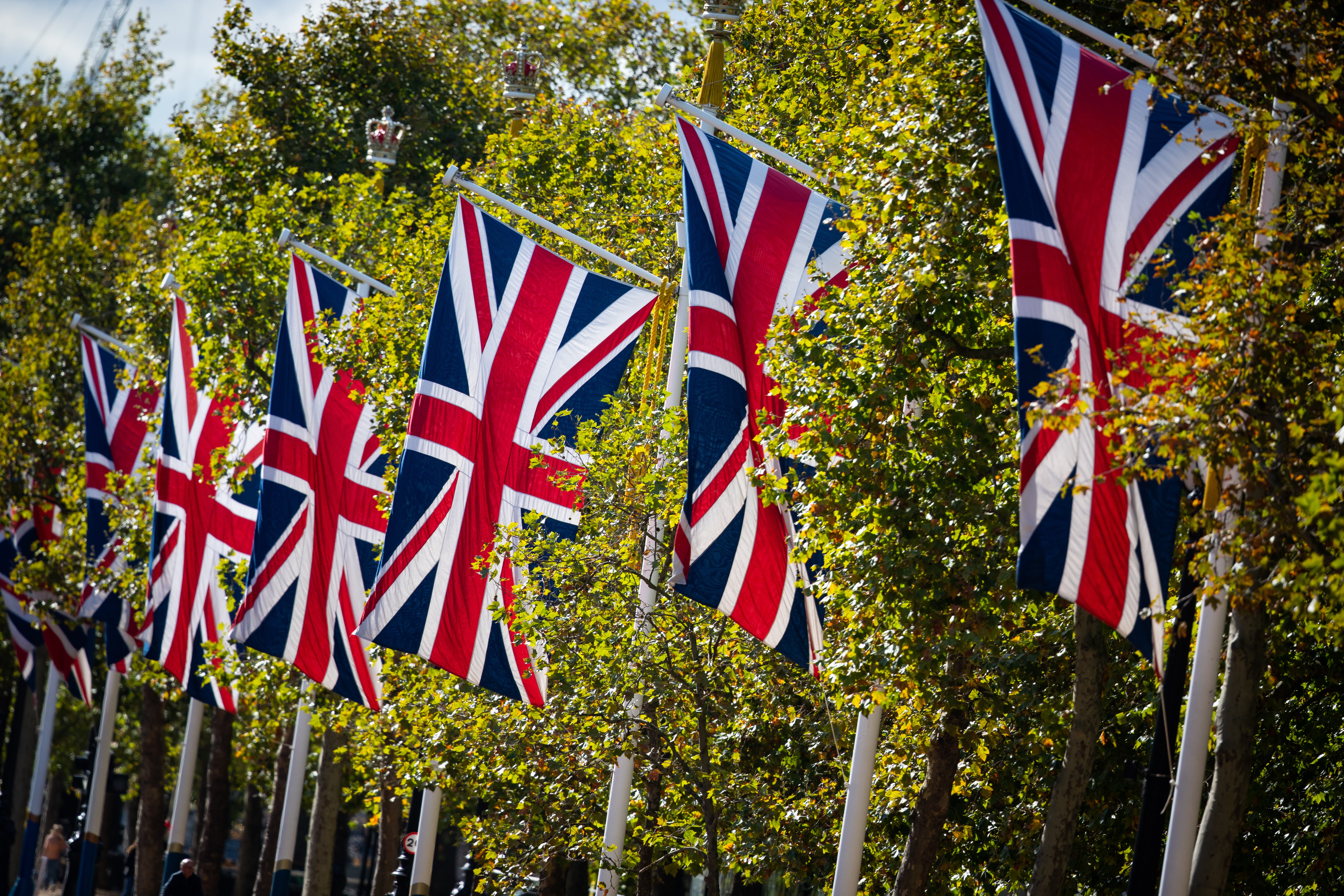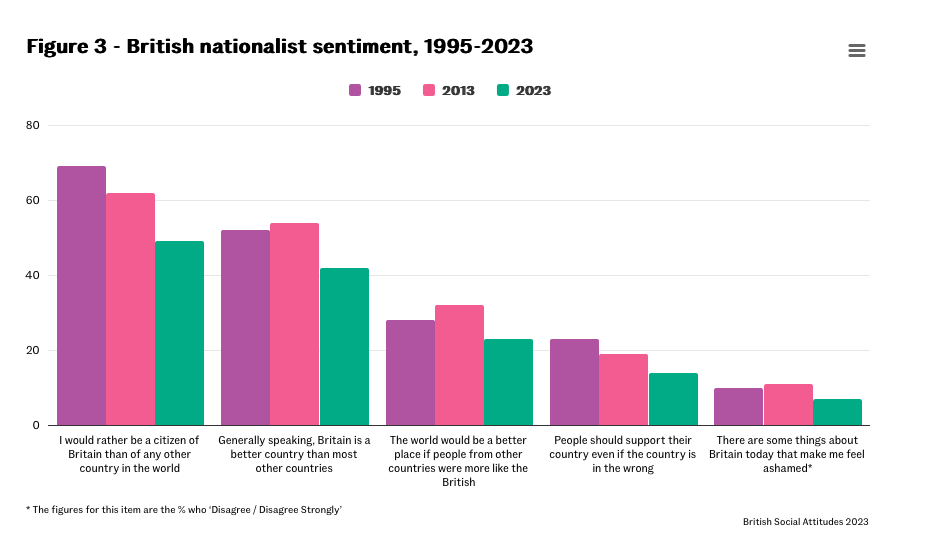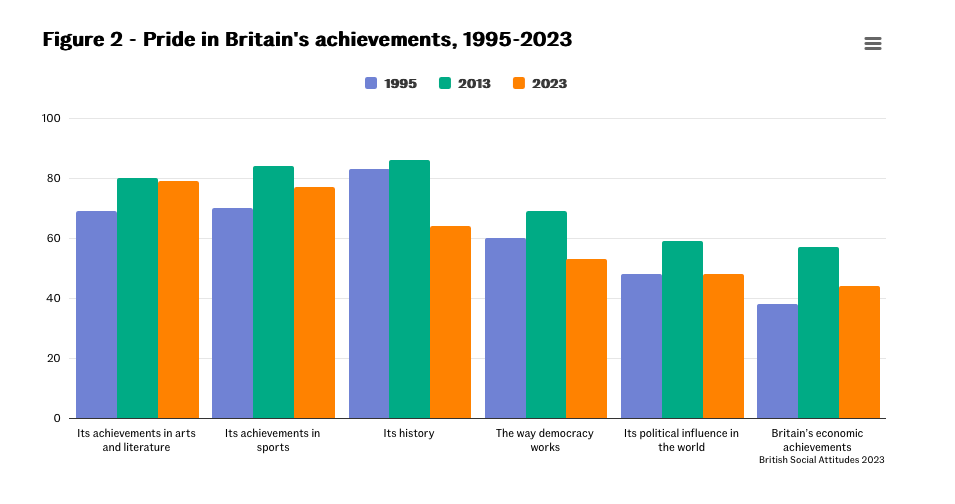Britons national pride has hit all-time low, new survey claims
Survey reveals high pride in Britain’s arts and sports but less in political and economic achievements

Your support helps us to tell the story
From reproductive rights to climate change to Big Tech, The Independent is on the ground when the story is developing. Whether it's investigating the financials of Elon Musk's pro-Trump PAC or producing our latest documentary, 'The A Word', which shines a light on the American women fighting for reproductive rights, we know how important it is to parse out the facts from the messaging.
At such a critical moment in US history, we need reporters on the ground. Your donation allows us to keep sending journalists to speak to both sides of the story.
The Independent is trusted by Americans across the entire political spectrum. And unlike many other quality news outlets, we choose not to lock Americans out of our reporting and analysis with paywalls. We believe quality journalism should be available to everyone, paid for by those who can afford it.
Your support makes all the difference.Pride in Britain’s history has hit an all-time low, a survey of the nation’s social attitudes has claimed.
Research from the National Centre for Social Research (NatCen) has revealed a sharp decline in national pride both in the last decade and since surveying began in 1995.
Those who said they would rather be a British citizen than any other country fell sharply by 20 per cent from 69 per cent in 1995 to 49 per cent in 2023.

The survey of around 1,600 people also revealed Britons saying they were proud, of the country’s history fell from 83 per cent in 1995 to 64 per cent in 2023.
Fewer people feel proud of the way democracy works, with 60 per cent saying they were in 1995 to just 53 per cent in 2023.
Some categories, such as Britain’s achievements in arts, literature, ports and economic achievement, remained level or even increased from 1995 but all categories have seen a decline since 2013.
The results of NatCen’s British Social Attitude (BSA) report comes just one week after Sir Keir Starmer said the far-right riots seen across the country last month had “exposed the state of our country”.

They “revealed a deeply unhealthy society”, he said, adding: “The cracks in our foundation laid bare, weakened by a decade of division and decline, infected by a spiral of populism”.
The report stated: “After increasing between the 1990s and the 2010s, pride in Britain’s achievements has fallen during the last decade, and especially so in respect of the country’s history,
“At the same time, nationalist sentiment appears to have waned. Despite Brexit and the debate about immigration, Britain has become less exclusive in its attitude towards Britishness, less likely to feel a sense of superiority as compared with the rest of the world, and somewhat more critical about its politics and its past.

“It is perhaps a picture of a country that to some degree at least becomes more reflective about itself and about its relationship with the rest of the world.”
Other aspects of the survey have revealed Britain has become more inclusive in its attitudes, with the proportion who think it is important someone was born in the UK in order to describe themselves as “truly British” has fallen from 74% in 2013 to 55% in 2023.
Those who believe it is important to have British ancestry has also dropped to 39% from 51% a decade ago.
Gillian Prior, deputy chief executive at NatCen, said: “Our latest report finds Britain has become more inclusive in its attitudes towards what it means to be British.
“These research findings show that whilst we are less likely to take pride in British history and more critical about its politics, there is still a great deal of national pride in the country’s cultural and sporting achievements.
“This change in attitudes may have been influenced by the increased diversity and shared citizenship within Britain, presenting a portrait of a nation redefining itself.”
Survey respondents were from England, Scotland and Wales.
Join our commenting forum
Join thought-provoking conversations, follow other Independent readers and see their replies
Comments